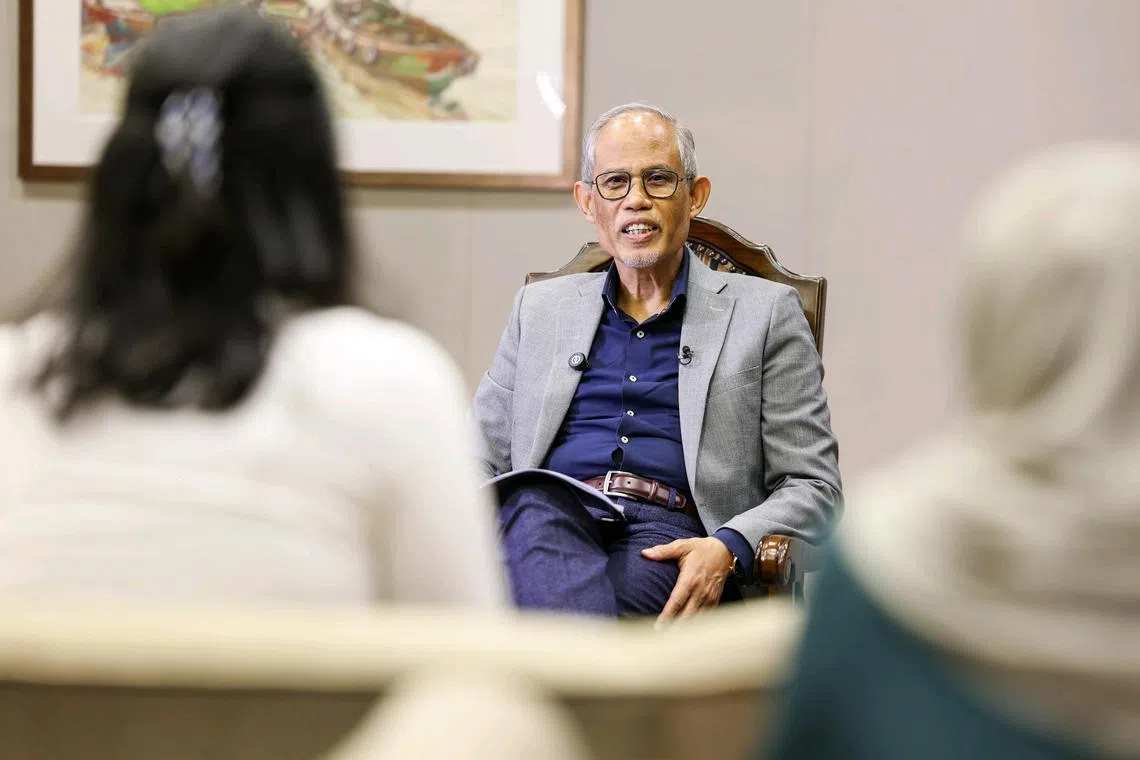Singapore Islamic college could help madrasah students pursue higher religious education locally
Sign up now: Get ST's newsletters delivered to your inbox

Minister-in-charge of Muslim Affairs Masagos Zulkifli said the college is aimed at teaching religious knowledge through the perspective of Singapore’s multi-racial, multi-religious society.
ST PHOTO: BRIAN TEO
Follow topic:
SINGAPORE - Madrasah students wishing to pursue higher religious education will have the opportunity to do so in Singapore through a new Islamic college, where they will learn how these teachings can be applied in the country’s context, said Minister-in-charge of Muslim Affairs Masagos Zulkifli.
The Singapore College of Islamic Studies (SCIS) does not intend to compete with thousand-year-old institutions such as Al-Qarawiyyin in Morocco, he said on Nov 13, noting that it is instead aimed at teaching religious knowledge through the perspective of Singapore’s multiracial, multi-religious society.
The college, which will open in 2028,
Singapore’s full-time madrasah system currently teaches students only up to the pre-university level, with an average of about 120 madrasah graduates pursuing further Islamic studies overseas each year.
Those who go to foreign institutions have to undergo a mandatory one-year postgraduate course upon returning, to apply what they have learnt overseas to the Singapore context.
Describing the college as a “longstanding aspiration of the Muslim community” here, Mr Masagos said SCIS can contribute to developing a body of knowledge that can help provide religious guidance to Muslims living as a minority in secular societies.
This is something religious scholars from other institutions have said is essential, he added, speaking to reporters at Parliament House.
SCIS is expected to welcome its first batch of 60 students in 2028, with classes to be held at the Islamic Religious Council of Singapore’s (Muis) Bencoolen campus.
Prime Minister Lawrence Wong said on Nov 10 that SCIS will offer a full-time undergraduate degree programme,
He said then that SCIS will partner with the Singapore University of Social Sciences (SUSS) for its social sciences pathway, and with Egypt’s Dar al-Ifta, Al-Qarawiyyin and the University of Jordan for its Islamic studies pathway.
Elaborating on this, Mr Masagos said the first two years will immerse students in both pathways, providing them with a foundation in social sciences and Islamic studies. They can then choose to specialise in one or the other in the third and fourth years of the programme, he said.
Those who graduate from SCIS with a degree in either Islamic studies or social sciences will also have the option to top up their hours to obtain a degree in the other field, he added.
This will give graduates the ability to move from the religious field to work in areas such as social work and counselling, and vice versa, Mr Masagos said.
He also announced that SCIS’ board of governors, which will lead the strategic oversight of the college, has been established, with former Cabinet minister Abdullah Tarmugi chairing it.
Mr Abdullah, who is currently a member of the Presidential Council for Minority Rights, said he looked forward to working with the board and the SCIS team to create “enriching learning journeys for our asatizah”.
“Our shared vision is to nurture religious scholarship that resonates with contemporary challenges, strengthen our community’s religious resilience, and contribute meaningfully to the future of religious leadership and the vibrant socio-religious life of Muslims in Singapore,” he said in a statement.
The board will look into matters such as remuneration and fees, said Mr Masagos, who will chair the college’s advisory panel.
The nine-member panel – which will focus on providing insights on international research opportunities and educational developments in line with SCIS’ needs – includes SUSS president Tan Tai Yong, Egypt’s Grand Mufti Nazir Mohamed Ayyad, and University of Edinburgh professor of Islamic and interreligious studies Mona Siddiqui.
Mr Masagos noted that schools such as Madrasah Alsagoff – which was established in 1912 and is the oldest of the Republic’s six full-time madrasahs – have produced religious leaders who have served not just in Singapore, but also around the region.
In the longer term, Mr Masagos said he hoped the college could serve religious leaders working in similar contexts as Singapore’s, such as Thailand, the Philippines and South Africa.
He also pointed to a slew of milestones the Malay/Muslim community can expect over the next five years.
These include the reopening of the Malay Heritage Centre – which closed for redevelopment in 2022 and is expected to reopen by end-2026
Correction note: In an earlier version of the story, we said that the Malay Heritage Centre is expected to reopen in 2025. The National Heritage Board has since clarified that the centre is expected to reopen in 2026.

